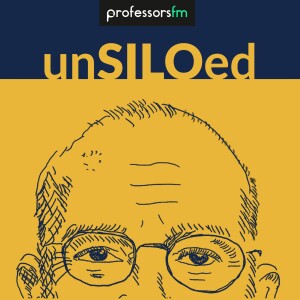
We like to think that technology makes the world a better place and that progress moves forward in a fairly linear fashion. And yet, there are plenty of signs that show well-being does not necessarily increase along with the sophistication of technology.
This idea is explored in Edward Tenner’s books, the most recent being The Efficiency Paradox: What Big Data Can't Do. A sequel to his previous book, Why Things Bite Back: Technology and the Revenge of Unintended Consequences.
He also just wrapped up a stint at the Institute for Advanced Study at Princeton University and is currently a scholar at the Smithsonian.
In this episode, Edward and Greg run through a number of scenarios based on revenge effects, risk associated with metrics, while factoring for human responses and serendipity.
Episode Quotes:On his latest book, The Efficiency Paradox: What Big Data Can't Do:
One of the arguments of my newest book, The Efficiency Paradox, is that too much efficiency in the short run makes us less efficient in the long run. And there is case after case of that, but the point of it is that very often it is the top managers who don't really take a holistic view of their enterprise and who don't understand that sometimes you really need to have more failures in order to have long-term success.
The single minded pursuit of efficiency:
If you focus too much on short-term metrics and short-term results, you're overlooking the needs for experimentation and failures and losses that will lead to greater long-term benefits. It’s really as simple as that.
Why we might want to hesitate on using metrics, in this case in publishing:
For example, Moby Dick was really considered a failure. It got bad reviews at first. If there was like, an AI that was supposed to evaluate the prospects for books, it probably would have been turned down. Harry Potter was turned down by 20 publishers.
And the reason for that is that a lot of extremely successful things, a lot of best-selling works are initially a little bit strange. They’re different. And so people who are using experience, people who are consulting their databases will really be unable to pick up on that. Sometimes you have to put something out there and see if it works or not.
Guest Profile:
- Edward Tenner’s Website
- Edward Tenner on Twitter
- Edward Tenner on Linkedin
- Speaker’s Profile at TED Talk
His work:
- Edward Tenner’s Published Essays and Articles
- The Efficiency Paradox: What Big Data Can't Do
- Our Own Devices: The Past and Future of Body Technology
- Why Things Bite Back: Technology and the Revenge of Unintended Consequences
More Episodes
Create your
podcast in
minutes
- Full-featured podcast site
- Unlimited storage and bandwidth
- Comprehensive podcast stats
- Distribute to Apple Podcasts, Spotify, and more
- Make money with your podcast
It is Free
- Privacy Policy
- Cookie Policy
- Terms of Use
- Consent Preferences
- Copyright © 2015-2024 Podbean.com







